Politics
US Election 2016: Donald Trump softens stance on Muslim ban
Republican presidential candidate Donald Trump appears to have softened his stance on temporarily barring Muslims from travelling to the US.
Responding to remarks by London Mayor Sadiq Khan, Mr Trump told Fox News Radio the ban was "just a suggestion".
Mr Khan has expressed concern that he would not be able to travel to the US under a Trump administration because of his Muslim faith.
Mr Trump had offered to make an "exception" for Mr Khan.
Mr Khan refused Mr Trump's offer, saying the New York businessman's views were "ignorant" and would make the UK and the US "less safe".
Mr Trump proposed a ban on Muslims entering the US after attacks in Paris killed 130 people last year.
The suggested ban has been widely criticised in the US and abroad but Mr Trump until now has stood by the proposal, saying it was needed to ensure US security.
"It's a temporary ban. It hasn't been called for yet," Mr Trump said on Wednesday. "This is just a suggestion until we find out what's going on."
Mr Trump has shifted positions in the past on a variety of issues only to change his stance days later.
Analysis: Anthony Zurcher, BBC North America reporter
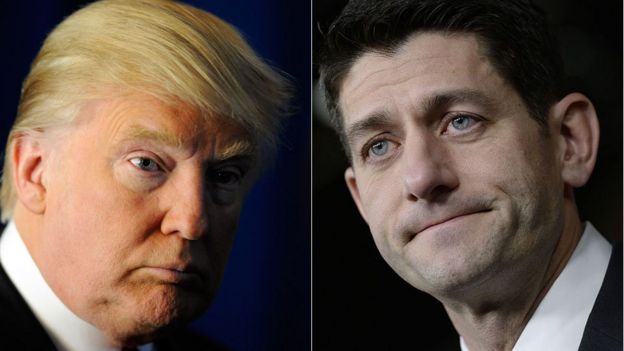
House Speaker Paul Ryan (right) says he is not ready to support Donald Trump's bid for presidency
It's likely no coincidence that Donald Trump has softened the rhetoric surrounding his call for a sweeping ban on Muslim immigration into the US on the eve of his closely watched Washington meeting with House Speaker Paul Ryan.
When Mr Trump first unveiled his proposal, Mr Ryan's response was short and sharp.
"This is not conservatism," he said.
At the time Mr Ryan's voice was just one of many in the Republican establishment condemning what seemed an extremely controversial proposal from the New York businessman.
Now Mr Trump is the presumptive nominee, and that Republican establishment has been moving - grudgingly - toward backing their new standard-bearer. Mr Ryan has been a holdout, however, saying he wants evidence that Mr Trump shares conservative values and principles.
Mr Trump's latest rhetorical swivel could be an olive branch to the speaker - and, perhaps, a fig leaf allowing Mr Ryan to eventually offer his support.
He has often given conflicting accounts on issues including his tax plan, abortion and transgender people accessing public toilets.
This flexibility has led to concerns among Republican Party leaders about his candidacy.
Top Republicans including House Speaker Paul Ryan have said they are not ready to support Mr Trump in the general election.
Mr Trump will meet Senator Majority Leader Mitch McConnell, Mr Ryan and others on Thursday in an attempt to resolve differences.
Also on Wednesday, Democratic presidential candidate Hillary Clinton and Mitt Romney - who ran against President Barack Obama in 2012 - separately raised questions about Mr Trump's tax returns.
Mr Trump has so far refused to release his tax records - a common practice among presidential nominees. Mrs Clinton has posted her past eight tax returns on her website.
"It is disqualifying for a modern-day presidential nominee to refuse to release tax returns to the voters, especially one who has not been subject to public scrutiny in either military or public service," Mr Romney said.
Source: bbc.com
- Read more
-
12/May/2016
Supreme court orders cleaning of register before November polls
A seven-member Supreme Court panel chaired by the Chief Justice, Georgina Wood, has ordered the Electoral Commission to clean the voters register before the 2016 elections.
The ruling follows a suit filed by former PNC youth organiser Abu Ramada challenging the credibility of the 2012 voters’ register as a valid database for the November general polls.
The Supreme court ordered the EC to delete names of deceased persons, persons who registered using the National Health Insurance Scheme (NHIS) cards as well as ineligible persons whose names are on the register, but also asked the commission to make provisions for those affected to register again under the law.
Abu Ramadan in the suit claims the voters’ register contains the names of persons who have not established qualification to be registered and therefore inconsistent with Article 45(a) of the Constitution thereby making same unconstitutional, null, void and of no effect.
Abu Ramadan in the suit was seeking the following reliefs:
1. A declaration that upon a true and proper interpretation of Article 45(a) of the Constitution of the Republic of Ghana, 1992 (hereinafter, the “Constitution”) the mandate of the Electoral Commission of Ghana to compile the register of voters implies a duty to compile, fair and transparent register.
2. A declaration that the 2012 Voters Register which contains the names of persons who have not established qualification to be registered is inconsistent with Article 42 and 45 (a) and therefore unconstitutional, null, void and of no effect.
3. An order setting aside the 2012 Voters Register and compelling the Electoral Commission to compile fresh Voters Register before any new public election or referendum is conducted in this country.
The Supreme Court a year ago ruled that the National Health Insurance card (NHIS) does not qualify anyone to be registered as a voter. That suit was filed by Abu Ramadan.
Source: kasapafmonline.com
- Read more
-
05/May/2016
US election: How Trump defied all predictions
America tonight stands on the doorstep of greatness, or the precipice of doom.
Under a candidate this divisive, there's not much room for feeling anything in between, as the realisation dawns that Donald Trump now has a plausible shot at being America's next president.
There has never been a candidate for the White House quite like this. He came into the race something of a joke, he conducted his campaign in ways that sometimes seemed like a joke (remember the steaks) but he won the nomination with totally serious conviction, demolishing his large field of competitors.
One by one, the primary wins stacked up and the other candidates fell. It was extraordinary to watch. The man almost no-one in the American political world took seriously defied all the predictions.
How did he do it?
Trump tapped into something we all should have seen, but failed to. For years, working class Americans have suffered from low employment and stagnant wages. They've watched the spread of globalisation, immigration and free trade and they felt left behind.
The US economy appeared to boom, but their lives didn't reflect that triumph. They had got a bad deal. Add to that an America that seemed to have faltered on the global stage and a president congenitally averse to nationalistic chest-thumping and Donald Trump was a gift.
From the billionaire's New York penthouse, he somehow understood the concerns of less educated Americans, particularly less educated American men.
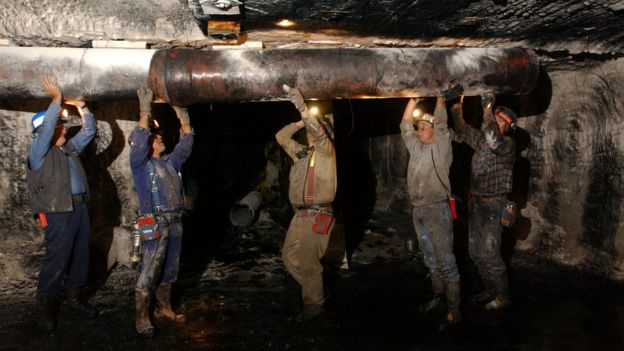
The coal industry in places like Pennsylvania has been drawn to Trump's message
He appeared to have an intuitive understanding of their loves and hates. He even said at one point in this absurdly long campaign that he loved the poorly educated. He knew they felt shackled by political correctness, and he gave them freedom to rail against it.
He knew they were afraid that their country was changing around them, increasingly populated by people whose first language was Spanish not English. When he suggested that Mexico was sending rapists across the border, he vindicated those fears. When he proposed to ban all Muslims from America, he gave voice to the anti-Islamic sentiment that's simmered in the US since 9/11.
It has been a remarkable display of political instinct from a man who's never been in politics. His supporters are so devoted to him that he could do no wrong. When he said Vietnam torture victim and war vet Senator John McCain wasn't a war hero, his approval ratings went up.
When he suggested a female reporter posed a tough question because she was menstruating, his numbers improved again.
Mexico, Muslims, Lyin' Ted... they all just fuelled the Trump train. And they love him most because he doesn't sound like all the politicians who have promised much and delivered little.

The southern border has become a key Trump issue
And yet, at the risk of being churlish on the night Mr Trump celebrates a stunning victory, it is worth noting how he has also alienated millions of Americans in a way we have not seen here in modern history.
Never has a candidate for the presidency been this reviled and rejected by some members of their own party. There is a long list (literally, you can find it on the website of The Hill newspaper) of Republican politicians and strategists who have said they will never vote for Trump.
In private there are many more who have said they will vote for Hillary rather than Donald.
These are the people - and I have spoken to many of them - who say their party's candidate is a "bigot", "racist", "misogynist". They call him "crass", "rude", "a bully".
Some of these people may now fall in line with the party leadership, hold their nose and tick the Trump box, but they don't like him.
If you broaden the surveys out to all Americans, Trump breaks records with his unfavourability ratings.
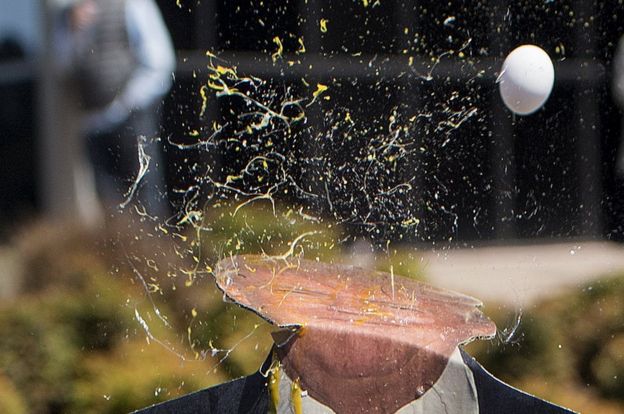
Protests against Trump are common in California
Which is why two groups are cheering tonight, team Trump and team Clinton.
The Clinton campaign remains convinced that this is the perfect race for them. They see Trump's negatives and they believe he is the best candidate they could have hoped for as their Republican opponent.
Moreover, the demographics of America would suggest that whoever is the Democratic nominee stands an odds-on chance of winning the White House - there are just more Democratic than Republican voters in the country.
But this is a curious year, the political rule book has been shredded and Donald Trump hates losing almost more than he loves winning.
The Clinton camp would be wrong to get too confident too soon. If we have learned one thing in this crazy campaign, it is that predictions are foolish.
Call me a fool, but I'm prepared to make just one more - the Clinton-Trump match-up is going to be brutal.
You thought the last 24 hours was ugly. You haven't seen anything yet.
Source: bbc.com
- Read more
-
05/May/2016
John Kasich, last Republican Trump rival, quits race
Ohio Governor John Kasich has dropped out of the presidential race after struggling to gain traction against Republican front-runner Donald Trump.
"As I suspend my campaign today I have renewed faith, deeper faith that the Lord will show me the way forward," he told supporters in Columbus.
Mr Kasich only won his home state but had hoped to lobby for his candidacy at July's Republican convention.
Mr Trump holds a commanding lead and is closing in on the nomination.
His likely opponent will be Democratic front-runner Hillary Clinton, who lost the Indiana primary to Bernie Sanders.
It was a surprise win for the Vermont senator who continues to attract huge crowds to his rallies, but his opponent has an almost insurmountable lead in votes and delegates.
Speaking to CNN about taking on Mr Trump, Mrs Clinton said he was a "loose cannon" who had run a "negative, bullying" campaign.
The New York businessman has made a series of controversial remarks ever since he launched his White House bid by labelling Mexicans as rapists and criminals.
Several senior Republicans said on Wednesday they would not back him, with some saying they would prefer to vote for Mrs Clinton.
Trump nomination divides Republicans
The race for the Republican presidential nomination has taken more than a year to unfold, but in a flash it is over.
Ted Cruz's withdrawal from the race Tuesday night meant John Kasich's long-shot path to the nomination - deadlocked delegates in a contested convention turning to him as a compromise candidate - was definitively closed.
The Ohio governor, once thought to be the saviour of the moderate, establishment wing of the Republican Party, could have soldiered on, but with little money and no hope of winning, such a course bordered on the absurd.
Although Mr Trump had effectively sewn up the nomination regardless of what Mr Kasich decided to do, his withdrawal does have one benefit. Now the New York businessman will not have to make even pro forma campaign stops in California, which holds its primary on 6 June.
Just last week the front-runner faced massive protests while attending the state's Republican convention. California looked to be a powder keg for Mr Trump in the coming weeks. Thanks to Mr Kasich, it has been defused.
Texas Senator Ted Cruz dropped out of the race on Tuesday after losing heavily to Mr Trump in the Indiana primary.
It is now certain Mr Trump will have the 1,237 delegates needed to become the nominee before the July convention in Cleveland, Ohio.
Mr Kasich had been widely seen as the most moderate and electable Republican candidate but this did not garner him enough support among Republican primary voters.
Republicans are now divided over whether to support Mr Trump as the Republican nominee.
"If we nominate Trump, we will get destroyed... and we will deserve it," South Carolina Senator Lindsay Graham said on Tuesday.
Mr Kasich's named has been floated as a possible vice presidential pick but he has denied that he would accept it.
Source: bbc.com
- Read more
-
05/May/2016
US election: Trump closes in on Republican nomination
Donald Trump has become the US Republican presidential nominee in all but name after victory in Indiana forced rival Ted Cruz from the race.
Mr Trump, unpopular with many in his own party, now has a clear path to the 1,237 delegates needed to claim his party's crown.
That would mark a stunning victory for a businessman few took seriously when he launched his campaign last year.
Bernie Sanders has defeated Hillary Clinton in Indiana's Democratic race.
He trails Mrs Clinton in the all-important delegate count but after this victory he said the contest was still alive.
"Clinton campaign thinks this campaign is over. They're wrong," he said.
What will Clinton v Trump look like?
As it happened - reaction to Cruz quitting
Indiana results as they come in
Mr Cruz's advisers had targeted Indiana as the Texas senator's best hope of halting Mr Trump's march to the nomination.
"We gave it everything we've got, but the voters chose another path," he told supporters in Indiana.
His departure means Mr Trump is now the presumptive Republican nominee, with plenty of state contests this month and next to reach the 1,237 delegates required to win.
The New York businessman is the first nominee since Dwight Eisenhower in 1952 to lack any previous experience of elected office.
Ohio Governor John Kasich has vowed to remain in the Republican race, but trails far behind Mr Trump in terms of delegates.
The Cruz party is over - Anthony Zurcher, BBC News, Indianapolis
Turn out the lights, the party's over. Ted Cruz and the #NeverTrump movement threw everything they had at Donald Trump in Indiana, and it wasn't enough. It wasn't even close to enough.
They outspent him by more than a million dollars. Mr Cruz practically took up residence in the state for the past two weeks. He named Carly Fiorina as his running mate. Nothing worked.
If there was a defining moment of the Indiana campaign, it was Mr Cruz's fruitless attempt to reason with a group of pro-Trump supporters on Sunday.
Every argument he advanced was rebuffed. Every bit of evidence of Trump malfeasance was denied. Mr Cruz was shouting in the wind.
In the coming days there will be a great reckoning, as the party comes to terms with the prospect of Mr Trump as their standard bearer in the autumn. Some will make peace. Some will despair. Others will say "I'm with her" and reluctantly move to Hillary Clinton's side.
It will be an unprecedented spectacle in modern US political history.
"It is a beautiful thing to watch, and a beautiful thing to behold," Trump said during a victory speech. "We are going to make America great again."
He praised Mr Cruz as a "tough, smart competitor", which marked a sharp reversal in tone after a day when the two men slung mud at each other from close quarters.
The verbal attacks reached a new level of intensity when Mr Cruz attacked the billionaire businessman as a "pathological liar" and "serial philanderer".
That was provoked by a bizarre claim from Mr Trump that Mr Cruz's father was linked to one of the most traumatic episodes in US history, the assassination of President John F Kennedy.
Trump links Cruz's father to JFK death
It is now increasingly likely that Mr Trump will face Mrs Clinton in the autumn in the battle to succeed President Barack Obama, who will be leaving the White House after two terms.
But Republicans have expressed reservations about Mr Trump's outspoken remarks, which have offended women and Hispanics.
There are also concerns about some of his policies on immigration and national security, like building a wall on the southern US border paid for by Mexico, a ban on Muslims coming to the US and the killing of the families of terrorists.
Source: bbc.com
- Read more
-
04/May/2016
Trump accuses China of 'raping' US with unfair trade policy
Republican presidential front-runner Donald Trump has accused China of "raping" the US, in renewed criticism of China's trade policy.
He told a rally in Indiana that China was responsible for "the greatest theft in the history of the world".
Mr Trump, a billionaire businessman, has long accused China of manipulating its currency to make its exports more competitive globally.
This, he says, has badly damaged US businesses and workers.
"We can't continue to allow China to rape our country, and that's what we're doing," he told the campaign rally on Sunday.
"We're going to turn it around, and we have the cards, don't forget it," he added. "We have a lot of power with China."
Trump's foreign policy - still no details
Newspapers react to Trump's foreign policy
Trump's foreign policy: So crazy it might just work?
Trump favours high tariffs on China exports
What China thinks of Trump
Premier Li Keqiang has said the US election "has been lively and has caught the eye", but many in China see it as more than that.
They consider the flamboyant New York billionaire an inspiration rather than an antagonist.
Read more: China's complex relationship with Donald Trump
In his campaign manifesto, Mr Trump pledges to "cut a better deal with China that helps American businesses and workers compete".
He sets out four goals that include immediately declaring China "a currency manipulator" and putting "an end to China's illegal export subsidies and lax labour and environmental standards".
Latest figures from the US government show the trade deficit with China reached an all-time high of $365.7bn (£250.1bn) last year. By February this year it had already reached $57bn.
Protesters
This is the first time Mr Trump has used the word "rape" in the context of China and trade, but his campaign has been punctuated by inflammatory comments.
He was confronted by hundreds of protesters in California on Friday before giving a speech to the state's Republican convention. Mr Trump was forced to enter the building by the back entrance.
Protesters were angry at his views on immigration: he has advocated building a border wall with Mexico, and has also referred to Mexicans as "rapists" and criminals responsible for bringing illegal drugs into the US.
Anti-Trump protesters were also out in force during the annual May Day rallies in California.
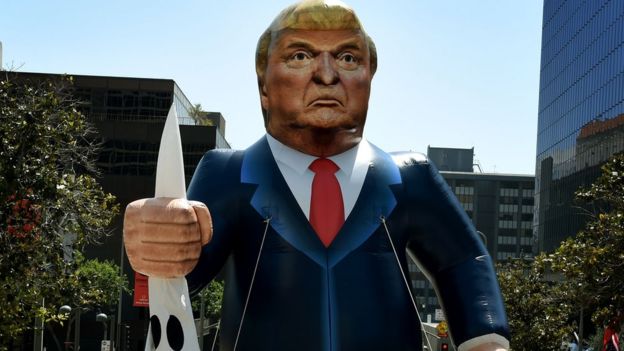
Donald Trump was the focus of anger for some at the May Day protest in Los Angeles on Sunday
The Trump campaign had to cancel several rallies in March after hundreds of protesters threatened to disrupt events in Chicago and St Louis.
Mr Trump has called himself the Republican "presumptive nominee" after a string of primary wins.
In terms of delegate support, the property tycoon is far ahead of his nearest rivals, Texas Senator Ted Cruz and John Kasich, the governor of Ohio.
On the other side of the race, Hillary Clinton is expected to beat Bernie Sanders to the Democratic nomination and fight for the presidency in November's general election.
Source: bbc.com
- Read more
-
02/May/2016
Liberia ex-footballer George Weah to run for president again
The former international footballer George Weah will run for president of Liberia for a second time.
He said he had the "vision" to transform the country.
Mr Weah, who played for teams including Paris Saint-Germain, AC Milan and Chelsea, was the highest-ranking African footballer in Fifa's list of greatest players of the 20th century.
His previous presidential bid, in 2005, was defeated by current president Ellen Johnson Sirleaf.
Her second term in office will end in 2017 and under the country's constitution she cannot run again.
During his football career, Mr Weah became a UN goodwill ambassador.
Later he turned to politics. He is currently a senator for the western province of Montserrado, which includes the capital Monrovia.
In 2011 he ran for vice-president under Winston Tubman but did not win.
Mr Weah belongs to the opposition Congress for Democratic Change (CDC) party.
Announcing his presidential bid in Monrovia, he said he had been a "victim of poverty" like many of his supporters, and said he would boost vocational education.
Anthem and portraits - Jonathan Paye-Layleh, BBC News, Monrovia
Liberia's national anthem was played before Mr Weah took to the stage.
First, he held a moment of silence in memory of the thousands of people who died of Ebola.
He told his crowd of supporters: "Our gathering here today is about the future of our country and our people.
"In the last ten years our people have continued to live in abject poverty, education a mess, health delivery system a disaster, electricity and pipe-borne water elusive."
"Like many of you, I have been a victim of poverty," he said. "There were times I didn't have school fees."
A leading research organization has recently rated Mr Weah's performance in the Senate as low.
Party members from across Liberia presented a petition asking him to run, saying they believed he was the man "to solve Liberia's numerous problems".
Some party members paraded up and down the sandy party headquarters, beneath giant portraits of Mr Weah.
They sang: "George Weah is the man we want, George Weah is the man we want."
Mr Weah pledged to increase the national budget, work towards religious harmony, and support vocational education.
To wild applause, he said: "God is with us, and hope is alive."
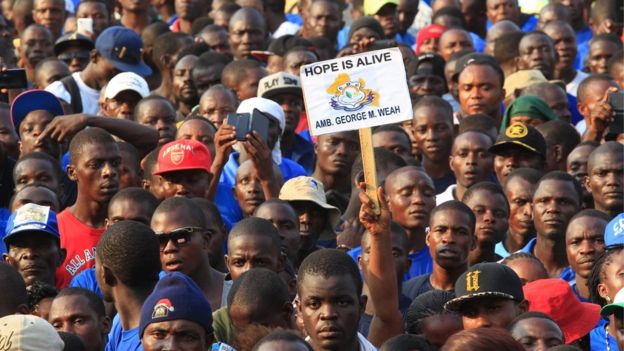
Thousands of CDC supporters turned out to petition George Weah to contest the presidential elections
Source: bbc.com
- Read more
-
29/Apr/2016
US election 2016: Former House Speaker Boehner calls Ted Cruz 'Lucifer'
US presidential hopeful Ted Cruz has been called "Lucifer in the flesh" by the former Speaker of the House of Representatives, John Boehner.
Mr Boehner, a fellow Republican, has also reportedly said he will not vote for Mr Cruz if he becomes the nominee.
Their rift dates back to when Mr Cruz led a group of hard-core conservatives to force a government shutdown in 2013, against his party's leadership.
Meanwhile, Mr Boehner has described Donald Trump as a "texting buddy".
He also said they have played golf together for years and that he would vote for the billionaire if he were the Republican nominee, the Stanford Daily reported.
The billionaire is the front-runner on the race for the Republican nomination, ahead of Mr Cruz.
The Texas senator is seen by many Republicans as the only option to prevent Mr Trump from being the party's candidate. Others, however, dispute this, saying he is a divisive figure.
- The rapid, rocky ascension of Ted Cruz
- Five things about Mr Cruz
- US election 2016: complete coverage
Mr Boehner, who was the most powerful Republican in US politics for a time until he resigned last October, used strong language when he spoke about Mr Cruz during a talk at Stanford University.
"I have Democrat friends and Republican friends. I get along with almost everyone, but I have never worked with a more miserable son of a bitch in my life," he said.
Inside divisions, by Anthony Zurcher, BBC News, Washington
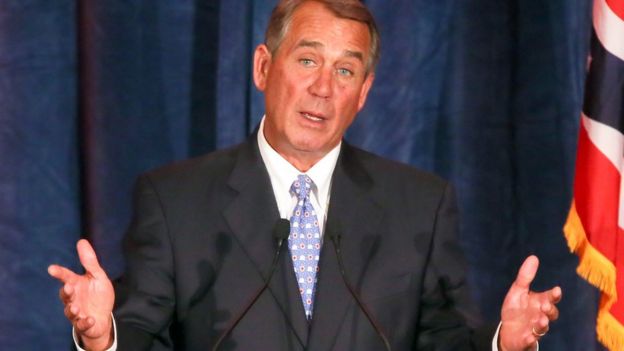
Mr Boehner had once called Mr Cruz a "jackass"
John Boehner tells us how he really feels.
At a time when Ted Cruz is struggling to save his presidential campaign, having a former high-ranking member of the Republican Party compare him to Beelzebub is, shall we say, unhelpful. It further reinforces the perception - hammered time and time again by Donald Trump - that Mr Cruz is too divisive, too abrasive, too unliked to be a successful leader.
The Texas senator likely would counter that he has made the right kind of enemies and the ire of the party establishment is a badge he will proudly wear. Unfortunately for him, however, the party establishment is just about the only thing left keeping his candidacy afloat. He has become the vessel for the #NeverTrump efforts - the last realistic candidate between Mr Trump on the nomination - and that movement is populated by insiders who, in any other situation, would not hesitate to stick a knife in Mr Cruz's back.
It seems Mr Boehner, happy in his retirement from politics, had no such reservations.
Mr Cruz is credited with having a large role in the federal government shutdown in 2013, when Mr Boehner was Speaker of the House.
The Texas senator is seen as having an aggressive posture and considers himself as an anti-establishment politician.
He reacted to Mr Boehner's remarks on Twitter, saying: "Tell me again who will stand up to Washington? Trump, who's Boehner's "texting and golfing buddy," or Carly & me?", he wrote, referring to Carly Fiorina, his pick for vice-president in an eventual candidacy."
When asked about the Democratic front-runner Hillary Clinton, Mr Boehner reportedly impersonated her saying "Oh I'm a woman, vote for me," which received a negative reaction from the crowd.
He later said they had known each other for 25 years and that he finds the former secretary of state to be very accomplished and smart.
Source: bbc.com
- Read more
-
29/Apr/2016
US election 2016: Trump details his foreign policy goals
Donald Trump has detailed his foreign policy in a speech, a day after sweeping to a win in five US primaries.
Mr Trump, the frontrunner for the Republican candidacy in the 2016 presidential race, said he would pursue an "America First" policy.
He called the foreign policy of President Obama's administration "a complete and total disaster".
On Tuesday, Mr Trump called himself the Republican "presumptive nominee" after his primary wins.
He claimed victories in Connecticut, Delaware, Rhode Island, Maryland and Pennsylvania.
What has Trump said so far on foreign policy?
While he has used his campaign to outline some of his foreign policy goals, this is the first time he has detailed them in a speech. He used a teleprompter, having previously said no candidate for the presidency should do so.
Earlier, he said the speech would not be a "Trump doctrine", and that he would retain some flexibility to make changes if elected.
Here are some of the main points he has made so far:

Mr Trump supports stronger interrogation of IS suspects
He says that no other candidate would be tougher on the so-called Islamic State (IS) and he would weaken the militants by cutting off their access to oil.
He has also said he supports waterboarding and other strong interrogation methods against IS. And while he says he would stay within the law, he would like laws on interrogation techniques expanded.
Read more: 26 things Trump believes
On nuclear weapons
The nuclear threat, and the risk of proliferation, is "the biggest problem the world has", Mr Trump told the New York Times last month. Using a nuclear weapon first would be "an absolute last step", he said.
On US allies
Mr Trump has decried what he calls the United States' position of "the world's policeman", and calls it a weakness. He has called for a reassessment of ties with some of Washington's closest allies.
Speaking to the New York Times about the US-Japan relationship, he said: "If we're attacked, they do not have to come to our defence, if they're attacked, we have to come totally to their defence. And that is a, that's a real problem."
Trump's foreign policy: So crazy it just might work?
On trade
On China, for example, he says it should be taken to task on a number of issues in order to make trade with the US more equitable. If elected, he says he will make China stop undervaluing its currency.
Who are his advisers?
Mr Trump once said he was his own best foreign policy adviser, but, in recent months, has expanded his back-room team. Some of his appointments had proved controversial.
The team is led by Republican Senator Jeff Sessions of Alabama who has helped shape Mr Trump's policies.
Another member, retired Gen Joseph Schmitz, resigned from the military in 2005 amid accusations of misconduct. However, Mr Schmitz was never charged with wrongdoing.
Another adviser, Walid Phares, was criticised when he was named as part of Mitt Romney's foreign policy team in 2011.
Muslim advocacy groups took issue with Mr Phares's close ties to right-wing Christian militia groups during the Lebanese civil war.
Read more: Trump names foreign policy advisers
What have others said?
- "It's a perfect storm of isolationism, muscular nationalism, with a dash of pragmatism and realism" - Aaron David Miller, former adviser to Republican and Democratic administrations between 1978 and 2003
- "He needs to show that he has the substance, the depth of knowledge and the vision to be the American commander-in-chief" - Steve Schmidt, former campaign manager to 2008 Republican candidate John McCain, to Reuters
Unorthodox foreign policy views?
What happened on Tuesday?
After his sweep of the five mid-Atlantic states, Mr Trump said of the battle for the Republican nomination: "It's over. As far as I'm concerned, it's over."
He told supporters in New York he would not moderate his policies if elected president.
For the Democrats, Hillary Clinton was denied a clean sweep by Bernie Sanders, after he won in Rhode Island.
After their victories, Mr Trump and Mrs Clinton turned their fire on each other.
Mr Trump said his Democratic rival's only advantage in the presidential race was being a woman.
"Frankly, if Hillary Clinton were a man, I don't think she'd get 5% of the vote," he said.
Mrs Clinton hit back at his accusation that she was playing the "woman card".
"Well, if fighting for women's healthcare and paid family leave and equal pay is playing the woman card, then deal me in," she told cheering supporters in Philadelphia.
Playing 'the woman card': How would a female Trump do?
Source: bbc
- Read more
-
27/Apr/2016
US election 2016: Trump sweeps all five US states
Donald Trump has won presidential primaries in all five US states that voted on Tuesday, while Hillary Clinton took four out of five.
Mr Trump called himself the Republican "presumptive nominee" after victories in Connecticut, Delaware, Maryland, Pennsylvania and Rhode Island.
The results bring him closer to the number of delegates he needs before the party's national convention in July.
For the Democrats, Mrs Clinton was denied a clean sweep by Bernie Sanders.
Mr Sanders won the vote in Rhode Island, and vowed to fight to the end of the primaries process.
Speaking at Philadelphia Convention Center after securing the four other states, Mrs Clinton said her campaign was setting "bold, progressive goals" to improve lives in the US.
"We believe in the goodness of our people and the greatness of our nation," she said.
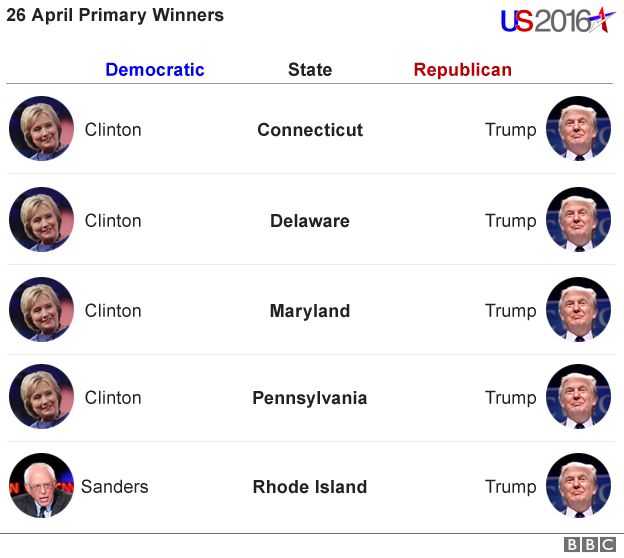
Meanwhile Mr Trump told supporters in New York he would not moderate his policies if elected president.
"I'm not changing," he said. "You know I went to the best schools. I'm like a very smart person. I'm going to represent our country with dignity and very well.
"But I don't really want to change my personality. You know, it got me here."
His rivals, Ted Cruz and John Kasich, have already shifted their attention to upcoming states, teaming up to help each other in the Indiana, Oregon and New Mexico primaries.
Mr Trump has condemned their pact as a sign of weakness and desperation, and another sign of the Republican party colluding against him. "The Republican party needs something much better than that," he said after his latest victories were announced on Tuesday.
Neither Mr Kasich nor Mr Cruz has a chance of securing the Republican nomination outright. The hope of a contested convention this July in Cleveland is keeping them in the race.
This scenario would see party delegates - Republican officials and activists - choose the nominee. However Mr Trump is edging closer to securing 1,237 delegates, which would mean he could secure the nomination before the convention.
Analysis: Anthony Zurcher, BBC North America reporter
There's winning, and then there's WINNING.
Donald Trump's night is shaping up to be the latter, as he steamrolls his opposition in all five of mid-Atlantic states voting on Tuesday.
This campaign season has been punctuated with a series of theories about how and why Mr Trump's presidential ambitions would eventually be thwarted. The latest was that he'd never be able to win more than 50% of the vote as the field narrows. It appears likely that he'll easily surpass that mark across the board and claim the lion's share of the delegates at stake.
During a primary night speech that took place before the polls even closed, Texas Senator Ted Cruz promised that his campaign was now heading to "more favourable terrain". He's setting up a firewall in Indiana, but there's a Trump-fuelled conflagration heading his way.
The New Yorker still has work to do to clinch the Republican nomination, but after his latest performance such a prospect seems increasingly likely.
Read more on the US election:
Can the Cruz-Kasich tag-team beat Trump?
Can Trump really change his image?
Is Wall Street a problem for Hillary Clinton?
Speaking in Huntington, West Virginia, after the vote, Bernie Sanders vowed to fight to the end of the nomination process, saying he would attract broad support in November's election.
"The reason that we are generating this enthusiasm is because we are doing something very unusual in contemporary politics. We are telling the truth," he said.
Despite some success, it is unlikely Mr Sanders will be able to overcome Mrs Clinton's lead to become the Democratic nominee for president.
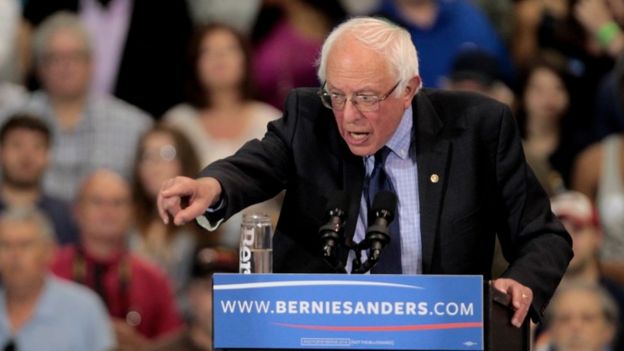
Bernie Sanders has vowed to remain in the Democratic contest until the end
The pact between Mr Kasich and Mr Cruz got off to a rocky start on Tuesday. The Ohio governor is to give Mr Cruz a "clear path" by not campaigning in Indiana and Mr Cruz will reciprocate in New Mexico and Oregon. But neither has endorsed tactical voting among their supporters.
Speaking in Indiana on Tuesday night, Mr Cruz said his supporters could look forward to some success as the race moved on to more conservative states.
His event was held at a basketball court where some scenes were filmed for the 1986 film Hoosiers, about a small-town high school basketball team that wins the state championship.
The Texas senator attempted to recreate a scene from the film but was mocked on social media for referring to a basketball "ring" rather than a "hoop".
Source: bbc.com
- Read more
-
26/Apr/2016
US election 2016: Trump and Clinton 'score early wins'
Donald Trump has won the presidential primaries in Connecticut, Maryland and Pennsylvania while Hillary Clinton is top in Maryland, US media project.
The two front-runners in the race for the White House are hoping to cement their leads after voters in five north-eastern states went to the polls.
Mr Trump's rivals have already shifted focus away from the north-east.
Ted Cruz and John Kasich have teamed up to help each other in the Indiana, Oregon and New Mexico primaries.
Mr Trump has condemned their pact as a sign of weakness and desperation. More to follow.
Source: bbc.com
- Read more
-
26/Apr/2016
Kenya's former first lady Lucy Kibaki dies in London
Kenya's controversial former first lady, Lucy Kibaki, has died in a London hospital of an undisclosed illness.
She gained notoriety for slapping a cameraman in 2005 when she stormed the offices of a private media group in anger at the way a story about her had been reported.
In a tribute to Mrs Kibaki, President Uhuru Kenyatta praised her for her role in fighting HIV/Aids in Kenya.
Mr Kenyatta succeeded her husband Mwai Kibaki, who governed from 2002 to 2013.
Mrs Kibaki, who was born in 1940, had withdrawn from public life during the latter part of her husband's rule.
She was last seen at a public function in August 2010, when she seemed excited about the adoption of a new constitution, dancing to a famous gospel song, Kenya's Daily Nation newspaper reports.
Mr Kenyatta said she had been unwell for the last month, receiving treatment in both Kenya and the UK.
Mrs Kibaki trained as a teacher, leaving her job not long after her marriage in 1962 to raise her four children.
"Her Excellency will be remembered for her immense contribution in the development of country," Mr Kenyatta said in a statement.
According to the Daily Nation, she organised the First International Aids Run in 2003.
But correspondents say she also provoked condemnation when she said unmarried young people had "no business" using condoms, calling on students to abstain from sex in order to avoid infection with HIV.
'Disturbing the peace'
Mrs Kibaki was the most controversial of Kenya's first ladies, crossing swords with politicians, diplomats, journalists and policemen she believed had not treated her with sufficient respect.
Just months after her husband became president, she is reported to have shut down a bar inside State House that was a watering hole for ministers and close allies of Mr Kibaki.
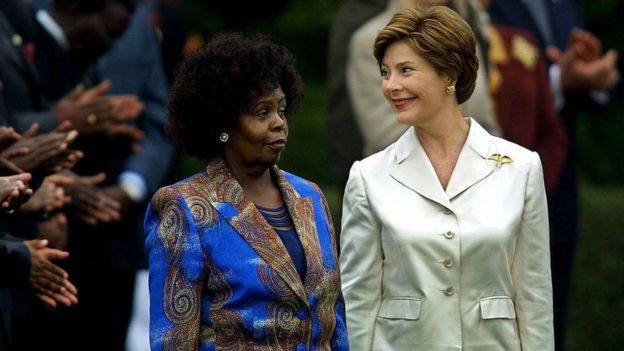
Former US First Lady Laura Bush hosted Mrs Kibaki at the White House in 2003
In 2005, she stormed into the house of her neighbour, the World Bank's then-country director Makhtar Diop, in a tracksuit at midnight and demanded he turn his music down at a private party to mark the end of his posting in Kenya.
She also went to the local police station in shorts to demand that Mr Diop and his guests be arrested for disturbing the peace.
Later, she burst into the offices of the influential Nation Media Group with her bodyguards and demanded that the reporter who had written about her confrontation with Mr Diop be arrested.
She slapped cameraman Clifford Derrick who was filming her and refused to leave the offices until 0530 the next day.
He tried to sue for assault, but the case was thrown out of court.
In 2007, Mrs Kibaki was filmed by Nation TV slapping an official during an independence day celebration at State House.
Security officials seized the video images and erased the slapping incident, before returning them.
Source: bbc.com
- Read more
-
26/Apr/2016
US election: Cruz-Kasich pact 'desperate' says Trump
Donald Trump says a pact formed by his two rivals for the Republican presidential crown is a desperate act.
He lambasted Texas Senator Ted Cruz and Ohio Governor John Kasich over the alliance they announced late on Sunday.
Under their plan, Mr Cruz and Mr Kasich will give each other a free run in state primary votes next month.
Before then, five US states go to the polls on Tuesday, when Mr Trump is expected to tighten his grip on the nomination.
He has a clear lead in party delegates but may still fall short of the 1,237 needed to win outright.
If he does not reach that figure, the vote will go to a contested convention - where delegates are free to back another candidate. A different nominee like Mr Cruz or Mr Kasich may emerge.
On Monday, Mr Cruz defended the deal, saying it was "great for Indiana and great for the country".
Can the pact work? - Anthony Zurcher, BBC News, Washington
This announcement comes just days before Mr Cruz and Mr Kasich are likely to receive a thorough drubbing in a handful of states in the mid-Atlantic, including delegate-rich Pennsylvania.
By Wednesday morning Mr Trump could have put considerably more distance between himself and his two opponents.
So this accord may be an early effort to push the focus past the next round of voting and on to more friendly contests.
Indiana is shaping up to be a pivotal battleground. A recent poll shows Mr Trump with a comfortable lead in a three-way race that narrows considerably if Mr Kasich is taken out of the equation.
Given the rules in Indiana - 30 delegates to the candidate who wins a statewide plurality and three delegates to the top finisher in each of the state's nine congressional districts - every bit of help Mr Cruz can get to edge past Mr Trump will be invaluable.
Speaking in Indiana, the Texas senator said Mr Trump winning the nomination would hand the White House to Democratic front-runner Hillary Clinton in November's election.
But in a series of tweets on Monday, Mr Trump, a New York businessman with no experience of elected office, said this was collusion from two weak candidates.
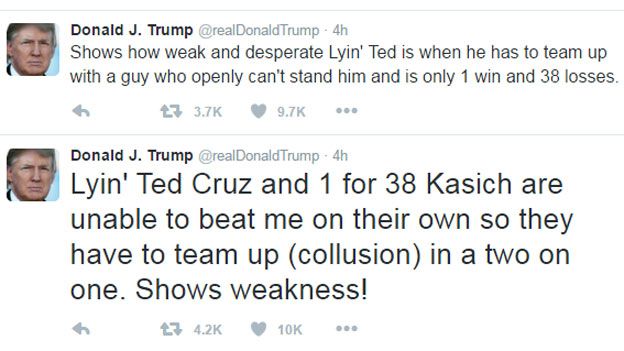
And in a statement, he said: "It is sad that two grown politicians have to collude against one person who has only been a politician for ten months in order to try and stop that person from getting the Republican nomination."
Mr Trump has waged war on the Republican National Committee over the process by which delegates are allocated, saying the system is "rigged" against him.
Read more on the US election
Can Trump really change his image?
Ted Cruz, the Texan Tea Partier
John Kasich, the governor of positivity
Five states go to the polls on Tuesday - Connecticut, Delaware, Maryland, Pennsylvania and Rhode Island.
Under the Cruz-Kasich plan, Mr Cruz will cut campaigning in the Oregon and New Mexico primaries and Mr Kasich will give Mr Cruz a "clear path" in Indiana.
Indiana and Oregon vote next month, with New Mexico to follow in June.
In the Democratic race, Mrs Clinton will be looking to tighten her grip on the nomination after her big New York win, but Vermont Senator Bernie Sanders says he still has a path to victory.
Source: bbc.com
- Read more
-
25/Apr/2016
US election 2016: Trump and Clinton win New York primaries
Donald Trump has won the Republican presidential primary in New York while Hillary Clinton has triumphed in the Democratic race.
With the majority of votes counted, Mr Trump looks set to extend his lead over rivals Ted Cruz and John Kasich.
Meanwhile Democratic hopeful Mrs Clinton, a former senator for New York, is on course for a resounding victory over Brooklyn-born Bernie Sanders.
Wins will put Mrs Clinton and Mr Trump closer to securing their nominations.
With almost 95% of the results in, Mr Trump is leading with just over 60% of the vote while Mrs Clinton has just under 58%.
As it happened: Trump and Clinton win in New York
US networks projected that Mr Trump had won in his home state barely seconds after the polls closed at 21:00 EDT (01:00 GMT).
Speaking at Trump Tower in Manhattan, he said: "I have to say to the people that know me the best - the people of New York - when they give us this kind of a vote it's just incredible."
He said he was going to get more delegates than "anyone projected even in their wildest imaginations".
The big question is whether the billionaire businessman will make a clean sweep of all 95 Republican delegates at stake in New York by earning the majority of votes.
This would reduce the chances of a contested nomination at the Republican party convention in July.
A new-look Trump has a chance - by Anthony Zurcher, BBC North America reporter
Donald Trump needed a commanding victory, and he got it. Although the results in the state's 29 congressional districts - which allocate three convention delegates apiece - have yet to be finalised, it appears likely that Mr Trump will claim the lion's share of the 95 delegates at play.
Perhaps even more importantly, however, is the new, restrained Donald Trump on the campaign trail in the past few days. Gone are the incendiary tweets bashing his opponents (and their spouses). Instead on Tuesday night the candidate gave a short speech hammering home his economic message, emphasising his delegate and vote lead, and laying the groundwork to argue that he should be the party's nominee even if he doesn't win the 1,237 delegates necessary to claim the nomination outright.
Mr Trump recently brought in several experienced political hands to manage his campaign after a turbulent few weeks. If this new demeanour is part of the change they have inspired, Mr Trump could prove to be a more formidable opponent not just at the ballot box in upcoming primaries but in the contest to win over those in the party still deeply suspicious of his candidacy.
"Tomorrow, we go back to work," Mr Trump said during his victory speech. It was a very un-Trump-like line - and something that should have his opponents very concerned.
Read more: Trump's surprising new style and other New York lessons
Claiming her win, Mrs Clinton told supporters her campaign for the nomination was "in the home stretch and victory is in sight".
"New Yorkers, you've always had my back and I've always tried to have yours," she said. "Today together we did it again and I am deeply, deeply grateful."
It has been a fierce campaign in the state, with the leading candidates using their local ties to attract voters.
The Democratic campaign has turned increasingly negative, with Mrs Clinton and Mr Sanders trading barbs about their qualifications.
But following the latest result in the race for the Democratic nomination, Mrs Clinton said there was "much more that unites us than divides us".
New York presidential primaries
Has New York shaped the Trump campaign? - It's the place where he built both his personal brand and his politics
What's New York's state of mind? - The issues that matter to voters from Buffalo to Brooklyn
Is Wall Street a problem for Hillary Clinton? - The 2016 presidential election is proving a trying time for this longstanding relationship
Full US election coverage from the BBC
The two front-runners for both parties cast their own votes in New York on Tuesday. Mr Trump cast his ballot at Central Synagogue in Manhattan in the morning, while Mrs Clinton voted with her husband, former President Bill Clinton, near their home in the suburb of Chappaqua.
They are the last presidential candidates to vote in the primary contest. Mr Sanders voted in his home state of Vermont in March, while Republican challengers Mr Cruz and Mr Kasich went to the polls in Texas and Ohio.
The voting in New York was marred by widespread complaints of irregularities, including more than 125,000 people missing from New York City voter rolls. The city's chief auditing officer, Scott Stringer, ordered a review of the city's Board of Elections (BOE) over what he called "chaotic and inefficient" organisation.
Although Mr Trump was sweeping to victory across most of the state, Ohio Governor Mr Kasich, otherwise in a distant second place, was leading in his home borough of Manhattan.
Meanwhile Mr Sanders, who has vowed to fight on in the nomination process, spent Tuesday in Pennsylvania before heading home to Vermont for a day off the campaign trail.
Republican hopeful Mr Cruz, whose criticism of "New York values" attracted scorn in the state, had also moved onto Pennsylvania and dismissed the New York result as nothing more than "a politician winning his home state", according to the Associated Press.
Pennsylvania is the most important of five states holding both Republican and Democratic primaries on 26 April, and then candidates will look to score successes in Indiana on 3 May.
Source: bbc.com
- Read more
-
20/Apr/2016
Germany Turkey: Merkel allows inquiry into comic's Erdogan insult
Germany will allow the potential prosecution of a top comedian after the Turkish president filed a complaint.
Jan Boehmermann had recited a satirical poem on television which made sexual references to Recep Tayyip Erdogan.
Under German law, Chancellor Angela Merkel's government had to approve a criminal inquiry.
Mrs Merkel stressed that the courts would have the final word, and it was now up to prosecutors to decide whether to press charges.
The chancellor added that her government would move to repeal the controversial and little-used Article 103 of the penal code, which concerns insults against foreign heads of state, by 2018.
Boehmermann is a satirist and television presenter well-known for pushing the boundaries of German humour. He was given police protection earlier this week.
Some experts say he has a strong defence against potential charges, because his poem could be seen as part of a wider piece of satire about free speech, rather than a deliberate insult, the BBC's Damien McGuinness reports from Berlin.
An earlier remark by Mrs Merkel that the poem was "deliberately offensive" had led to accusations in Germany that she was not standing up for free speech.
The poem was broadcast on ZDF television two weeks ago. The public TV channel has decided not to broadcast Boehmermann's weekly satire programme this week because of the furore surrounding him.
Turkish row stirs German free speech fears
A rarely used article of the criminal code
Paragraph 103 of Germany's penal code, on defamation of organs and representatives of foreign states, has the following to say:
(1) Whosoever insults a foreign head of state, or, with respect to his position, a member of a foreign government who is in Germany in his official capacity, or a head of a foreign diplomatic mission who is accredited in the Federal territory shall be liable to imprisonment not exceeding three years or a fine, in case of a slanderous insult to imprisonment from three months to five years.
The article dates back to the penal code drafted when the German Empire was formed in 1871, although at that time it just applied to monarchs.
It has been little used in recent years and is colloquially known as the "Shah law" among German lawyers after the Shah of Persia successfully brought a case against a Cologne newspaper in 1964.
A Swiss man living in Bavaria was also prosecuted under the article in 2007, after he posted offensive comments about the then-Swiss President, Micheline Calmy-Rey, on the internet, according to German and Swiss media.
Criminal code in full (in English)
Before announcing that Boehmermann could be prosecuted, Mrs Merkel stressed her government expected Turkey to comply with EU democratic norms in the areas of free speech and judicial independence.
"In a state under the rule of law, it is not a matter for the government but rather for state prosecutors and courts to weigh personal rights issues and other concerns affecting press and artistic freedom," she said.
"The presumption of innocence applies," she added, explaining that she was not making any prejudgement about Boehmermann.
In her statement in Berlin, Mrs Merkel said that the approval of the federal government was a legal precondition for the prosecution of this specific offence.
"The foreign office, the justice ministry, the interior ministry and the chancellery took part in this review," she said.
"There were diverging opinions between the coalition partners... The result is that in the present case the federal government will grant its approval."
Mr Erdogan has drawn much criticism in Turkey and internationally for attacking opponents, including harassment of journalists. Many accuse him of authoritarian methods, stifling legitimate dissent and promoting an Islamist agenda.
Some Germans worry that Mrs Merkel is compromising on freedom of expression in order to ensure Turkey's continued co-operation to stem the influx of migrants into the EU.
Thomas Oppermann, head of the Social Democrat (SPD) group in the German parliament, tweeted: "Prosecution of satire due to 'lese majesty' does not fit with modern democracy."
Source: bbc.com
- Read more
-
15/Apr/2016
US Election 2016: Top UN official condemns Trump
The UN High Commissioner for Human Rights has condemned the policies of US Republican presidential front-runner Donald Trump, equating them to bigotry.
Zeid Raad al-Hussein did not mention Mr Trump by name, but he singled out the businessman's support of torture and his policies towards Muslims.
"Bigotry is not proof of strong leadership," Mr Hussein said.
The commissioner also criticised a plan by rival candidate Ted Cruz to conduct surveillance on Muslim neighbourhoods.
"Hate speech, incitement and marginalisation of the 'other' are not a tittering form of entertainment, or a respectable vehicle for political profit," Mr Hussein told an audience in Cleveland, Ohio.
He added: "A front-running candidate to be president of this country declared, just a few months ago, his enthusiastic support for torture (...) inflicting intolerable pain on people, in order to force them to deliver or invent information that they may not have."
During the campaign, Mr Trump has said that "torture works" and promised to bring back "a lot worse than waterboarding".
Waterboarding and other harsh interrogation techniques previously used by US forces on terror suspects have been banned by the Obama administration.
Mr Trump's controversial statements have been criticised by world leaders including UK Prime Minister David Cameron, Mexican President Enrique Pena Nieto and Pope Francis.
Mr Cameron called Mr Trump's plan to ban Muslims from travelling to the US "divisive, stupid and wrong".
Both Pena Neito and the Pope have taken issue with Mr Trump's call for a border wall between the US and Mexico.
Correspondents say Mr Hussein's tough talk is unlikely to sway Mr Trump. The New York billionaire has been a harsh critic of the UN on the campaign trail.
"The United Nations is not a friend of democracy," Mr Trump told Israeli activists in March. "It's not a friend even to the United States of America, where as all know, it has its home. And it surely isn't a friend to Israel."
Source: bbc.com
- Read more
-
15/Apr/2016
Kerry: Shooting down Russia jets 'would have been justified'
The US military would have been within its rights to shoot down Russian aircraft that flew close to one of its warships in the Baltic Sea, Secretary of State John Kerry says.
Two Russian jets flew within metres of the ship on Monday, US officials said.
Russia's defence ministry said the Su-24 fighter jets "turned away in observance of all safety measures" after observing the USS Donald Cook.
Mr Kerry criticised the gesture and said contact had been made with Moscow.
"We condemn this kind of behaviour," he told the Miami Herald and CNN Espanol in a joint interview.
"It is reckless. It is provocative. It is dangerous. And under the rules of engagement, that could have been a shoot-down."
He added that the US "is not going to be intimidated on the high seas" and that a message had been conveyed to Russia over the danger of such a gesture.
The chill between Putin & Obama
Individual Nato members' rules of engagement should clearly outline what are defined as "actions that might be construed as provocative", according to the organisation's own guidelines.
Applying those rules of engagement "requires commanders at all levels to exercise considerable judgment", Nato says.
Mr Kerry did not specify why the US Navy did not fire at the jets.
The two Russian jets flew over the US destroyer almost a dozen times, American officials said.
At one point the jets were so close, about 9m (30ft), that they created wakes in the water around the ship.
The ship was sailing close to a Russian navy base, Russia's defence ministry said.
"After spotting the ship, Russian pilots turned away from it in full compliance with safety measures.
"All flights of the Russian aircraft are in strict compliance with international rules of the use of air space above neutral waters."
The commander of the Donald Cook described the flights as a "simulated attack".
The passes were "unsafe, potentially provocative" and "could have caused an accident," officials said in a release.
The actions of the Russian jets may have violated a 1970s agreement meant to prevent dangerous incidents at sea, but it is not clear whether the US is going to protest.
A Russian helicopter taking pictures also passed by the ship seven times.
The Donald Cook was conducting deck landing drills with an allied military helicopter when the jets made their passes, according to a statement from the United States European Command.
The US suspended flight operations from the ship until the Russian jets left the area.
The next day, a Russian KA-27 helicopter flew circles at low altitude around the ship, followed by more jet passes.
The aircraft did not respond to safety warnings in English or Russian.
Source: bbc.com
- Read more
-
15/Apr/2016
North Korea missile test fails, says South
North Korea conducted a missile test off its east coast on Friday morning, but the launch appears to have failed, say US and South Korean officials.
The rocket has not yet been identified but is suspected to have been a previously untested "Musudan" medium-range ballistic missile.
The launch coincided with the birthday of North Korea's founding leader, Kim Il-sung.
It also comes amid particularly high tension on the Korean peninsula.
- Is South Korea equipped to defend itself?
- A world leader in dramatic rhetoric
- How potent are the threats?
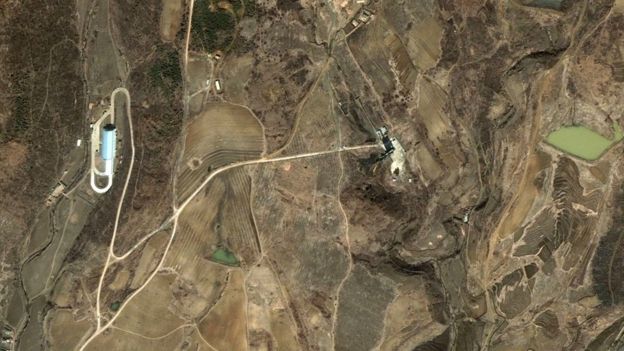
The missile is named after the Musudan village in the northeast, where a launchpad is sited
South Korea's Yonhap national news agency quoted government sources as saying that the missile was a type of intermediate-range ballistic missile known as a Musudan, also called the BM-25.
North Korean forces were seen recently moving two such missiles.
The report said it would be the North's first Musudan test, and that it may have at least 50 more.
The Musudan is named after the village in North Korea's northeast where a launch pad is sited.
It has a range of about 3,000 km (1,800 miles), which extends to the US Army base on the Pacific island of Guam, but not as far as the mainland US.
The US said it had tracked the latest launch, but could also not confirm details,
"We call again on North Korea to refrain from actions and rhetoric that further raise tensions in the region and focus instead on taking concrete steps toward fulfilling its international commitments and obligations," a State Department official said.
China also criticised what it called "the latest in a string of sabre-rattling that, if unchecked, will lead the country to nowhere," according to the official Xinhua news agency.
The BBC's Stephen Evans in Seoul says that even though it failed, the test illustrates the determination of current leader Kim Jong-un to get the ability to strike the United States, but also the North's technological limitations.
The North has made a series of threats against the South and the US since the UN imposed some of its toughest ever sanctions on the country.
The move was a response to the North's fourth nuclear test in January and its launching of a satellite in February, both of which broke existing sanctions.
In March, North Korea said it had developed nuclear warheads small enough to fit on ballistic missiles. However, experts cast doubt on the claims.
The birthday of North Korea's founder - Mr Kim's grandfather - is significant. Four years ago, the North tried to celebrate it with a similar missile launch, but that, too failed.
Source: bbc.com
- Read more
-
15/Apr/2016
US Election 2016: Clinton and Sanders raise the volume in feisty debate
Presidential hopefuls Hillary Clinton and Bernie Sanders ratcheted up their attacks in a bruising, final debate before next Tuesday's New York primary.
The Democratic race has turned increasingly negative in recent days as the candidates traded barbs about their qualifications for the presidency.
They also clashed on Wall Street banks, gun controls and the minimum wage.
Mr Sanders has won seven of the past eight contests, but Mrs Clinton holds a clear lead in race for the nomination.
The Democrats have largely avoided the personal attacks that have dominated the Republicans' debates.
But with so much at stake that changed in Thursday's debate.
"Does Secretary Clinton have the experience and intelligence to be president? Of course she does," Mr Sanders said at the debate. "But I do question her judgement."
Analysis by Anthony Zurcher, BBC North America Reporter
New York has a reputation for brashness and bellicosity, and it seemed that attitude may have rubbed off on the two participants in the Democratic debate in Brooklyn.
Practically from the opening bell, Hillary Clinton and Bernie Sanders went after each other's policy positions and records with a vigour that stood in stark contrast to the polite exchanges of past debates. Sure, they were both qualified to be president, they admitted, but both questioned their opponent's "judgment".
The former secretary of state knocked Mr Sanders off balance on gun control, quipping when he let out a chuckle during her response that 30,000 people dying a year is "not a laughing matter". Meanwhile, the Vermont senator once again bashed Mrs Clinton for her support of the 2003 Iraq War - tying it to the same kind of "mentality" that led to an ill-fated US intervention in Libya.
At one point moderator Wolf Blitzer tried to break up a heated exchange by warning that "if you're both screaming at each other, the viewers won't be able to hear either of you".
They kept talking. At this point in the marathon Democratic campaign, neither side can afford to let an attack go unanswered.
Mr Sanders repeatedly criticised Mrs Clinton for her financial ties to Wall Street, particularly her paid speeches to an investment bank. He also faulted her for supporting the Iraq War.
Meanwhile, Mrs Clinton has questioned whether Mr Sanders has adequately thought out his policy proposals after he struggled to provide specifics during an interview with the New York Daily News.
"It's easy to diagnose the problem. It's another thing to do something about it," Mrs Clinton said.
The candidates' recent tensions were on display on stage. Mr Sanders mocked Mrs Clinton's responses at times while Mrs Clinton occasionally talked over her opponent.
Other highlights included:
- Mr Sanders promised to release his past tax returns on Friday. but Mrs Clinton said she would not release transcripts of her paid speeches
- Mrs Clinton said she would support a $15 federal minimum wage if it was passed by a Democratic Congress
- Mrs Clinton aggressively criticised Mr Sanders' record on gun control, pointing out he voted to shield gun makers from legal liabilities
- Mr Sanders spoke passionately about the threat of climate change. "Those little steps are not enough," he said of the policies of the Obama administration
- Mrs Clinton defended her role in the US intervention in Libya; Mr Sanders faulted her for the breakdown in security in that country
- Mr Sanders called for European allies to contribute more financial support to Nato, echoing sentiments from Republican front-runner Donald Trump
- "We can't continue to be one sided," Mr Sanders said of America's role in solving the Israeli-Palestinian conflict
- Mrs Clinton offered a full-throated defence of abortion rights, eliciting cheers from the crowd
More on the 2016 campaign
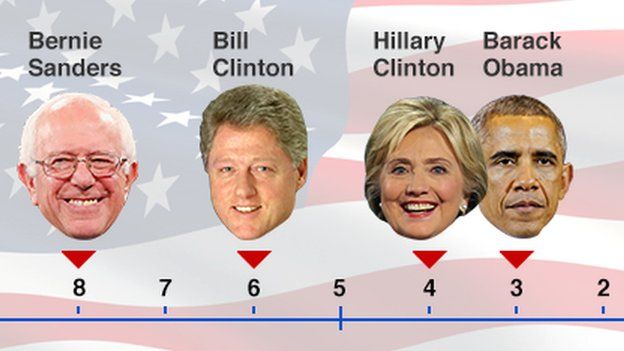
Mr Sanders is one of the most left-leaning candidates in recent history
The Democrats on the issues - How do Mr Sanders and Mrs Clinton compare to past Democrats?
#BernieMadeMeWhite: Minority supporters of Sanders speak out - Supporters push back against "all-white" narrative
Is Wall Street a problem for Hillary Clinton? - Support from the financial sector is an asset and liability
Full US election coverage from the BBC
A resurgent Mr Sanders has won seven of the last eight contests, sparking a groundswell of enthusiasm from his supporters.
The Sanders campaign drew more than 25,000 people to a rally on Wednesday in Washington Square in Manhattan.
However, buoyed by earlier wins across the southern US, Mrs Clinton holds a sizeable lead in the number delegates needed to secure the nomination.
Many analysts believe that Mr Sanders needs to pull off an upset in New York to remain viable in the race.
Mrs Clinton, who represented the state in US Senate for two terms, holds a commanding lead in New York, according to recent polls.
Source: bbc.com
- Read more
-
15/Apr/2016
US election: Trump accuses Republican leaders of conspiracy
Republican Donald Trump has said the party's leaders do not want him to win the presidential nomination.
The system was "stacked" against him, he said in New York, accusing the Republican National Committee (RNC) of conspiring against him.
His comments come after his rival Ted Cruz was awarded all the delegates in Colorado without a state-wide vote.
Mr Trump leads the race but may fall short of getting enough delegates to get the nomination outright.
That would lead to a contested convention in July, where delegates are free after the first ballot to back whom they want, opening the door for Texas Senator Mr Cruz or even the third candidate in the race, John Kasich.
The Washington Post reported on Wednesday that Mr Cruz is likely to win on a second vote, because he has persuaded so many delegates to vote for him when they are "unbound" to vote as pledged.
But Republican National Committee chairman Reince Priebus rejected Mr Trump's charge that the rules in states like Colorado had been changed in response to his rise in the polls.
Mr Priebus tweeted that the nomination process had been well known for more than a year.
"It's the responsibility of the campaigns to understand it. Complaints now? Give us all a break."
Asked at a town hall event in New York whether the RNC wanted him to win, Mr Trump said: "No, I don't think so. I really don't."
He has been criticised for not campaigning hard enough on the ground in states like Colorado.
But Mr Trump said delegates who wanted to support him were being pushed out by the RNC.
"They don't like when I put up my own money because it means they don't have any control of me because I'm working for the people," he said.
Analysis - Anthony Zurcher, BBC North America reporter
Donald Trump's insurgent presidential candidacy has proven to be extremely successful in besting a fractured Republican field at the ballot box, propelling him to a commanding lead in the race for the nomination.
What his campaign has not been built to do is engage in the gruelling, behind-the-scenes political combat that comes in the weeks and months after the headline-generating nominating contests. Although Mr Trump has received almost 2 million more votes than Ted Cruz, it's the Texas senator who is prevailing in the unglamorous race to ensure that the Republican National Convention floor is packed with loyalists who, in a nominating free-for-all, will stand by their candidate.
Before Mr Trump complains too loudly about the undemocratic nature of the process, however, it should be noted that at least so far he's won a larger share of pledged convention delegates (45%) than he has of the raw vote in nomination contests (37%).
In this close, contentious primary season, the veneer of accountability is rubbing off, exposing the sometimes unsightly gears that still power the US political system. It isn't a pretty sight - and it's difficult for anyone to claim the moral high ground.
Is the US presidential race 'rigged'?
Most states have opted to hold state-wide primaries or caucuses to determine the number of delegates pledged to a particular candidate.
But Colorado decided last summer to select its delegates in a different way, at its own state convention.
The state-by-state primary contests come to New York next week where a high number of delegates will be up for grabs.
Several senior Republicans have expressed opposition to Mr Trump winning, doubting his ability to win a general election and disagreeing with his hard line on immigration.
Mr Trump has broken an earlier pledge he made to support whoever the Republicans nominate, therefore refusing to rule out a third-party run.
He has said there will be "riots" if he is not chosen as the party's nominee, having headed to the convention with the most delegates.
Source: bbc.com
- Read more
-
13/Apr/2016
About Us
-
Archives
Recent posts
News for people who want to know
- Bakus Radio resource for |Ghana & Africa music |News |Entertainment |Sports | Copyright © 2016 . All Rights Reserved.
- Designed By Fresco Software Solution Pvt. Ltd.



























